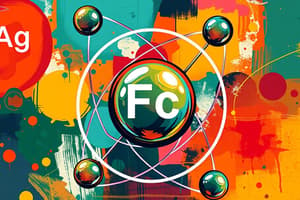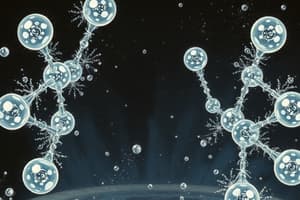Podcast
Questions and Answers
What distinguishes cations from anions?
What distinguishes cations from anions?
- Both cations and anions have an equal number of protons and electrons.
- Cations are positively charged while anions are negatively charged. (correct)
- Cations have more electrons than protons.
- Anions have more protons than electrons.
What forms a cation?
What forms a cation?
- An atom losing neutrons.
- An atom gaining electrons.
- An atom losing electrons. (correct)
- An atom gaining protons.
Which statement about ions is true?
Which statement about ions is true?
- Cations attract other cations.
- All ions have the same charge.
- Cations and anions attract each other. (correct)
- Anions cannot form from losing electrons.
How do neutral atoms differ from ions?
How do neutral atoms differ from ions?
What is true about anions?
What is true about anions?
Flashcards are hidden until you start studying
Study Notes
Atoms
- Atoms are the basic building blocks of matter.
- Neutral atoms have an equal number of protons and electrons.
Ions
- Ions are charged atoms.
- Cations are positively charged ions formed when an atom loses electrons.
- Anions are negatively charged ions formed when an atom gains electrons.
- Cations and anions attract each other due to their opposite charges.
Studying That Suits You
Use AI to generate personalized quizzes and flashcards to suit your learning preferences.




